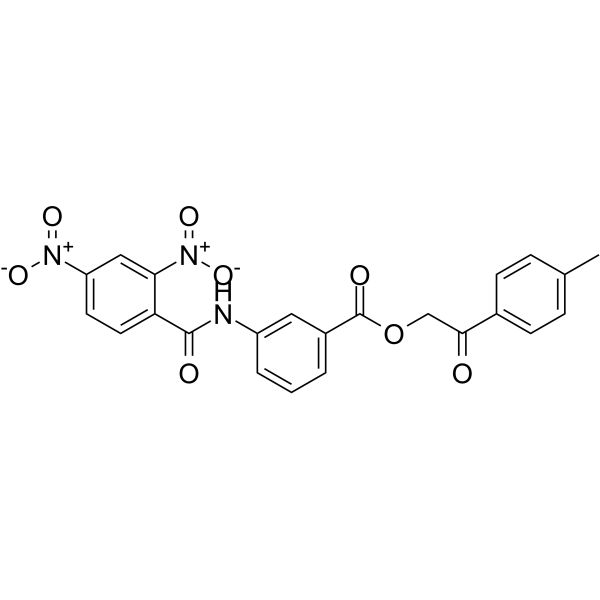
FM19G11
CAS No. 329932-55-0
FM19G11( HIF-1alpha/2alpha Inhibitor )
Catalog No. M28084 CAS No. 329932-55-0
Hypoxia inducible factor (HIF) α-subunit inhibitor (IC50 = 80 nM in hypoxia induced luciferase assay). Inhibits transcriptional activity of HIFα isoforms.
Purity : >98% (HPLC)
 COA
COA
 Datasheet
Datasheet
 HNMR
HNMR
 HPLC
HPLC
 MSDS
MSDS
 Handing Instructions
Handing Instructions
| Size | Price / USD | Stock | Quantity |
| 5MG | 87 | Get Quote |


|
| 10MG | 160 | Get Quote |


|
| 25MG | 357 | Get Quote |


|
| 50MG | 530 | Get Quote |


|
| 100MG | 759 | Get Quote |


|
| 500MG | 1557 | Get Quote |


|
| 1G | Get Quote | Get Quote |


|
Biological Information
-
Product NameFM19G11
-
NoteResearch use only, not for human use.
-
Brief DescriptionHypoxia inducible factor (HIF) α-subunit inhibitor (IC50 = 80 nM in hypoxia induced luciferase assay). Inhibits transcriptional activity of HIFα isoforms.
-
DescriptionHypoxia inducible factor (HIF) α-subunit inhibitor (IC50 = 80 nM in hypoxia induced luciferase assay). Inhibits transcriptional activity of HIFα isoforms. Directly regulates expression and inhibits transcriptional activity of pluripotency markers (Sox2 and Oct4) in rodent and human stem cells under hypoxic conditions, driving differentiation. Improves locomotion after severe spinal cord injury in mice, alone or in combination with transplantation of ependymal stem cells of the spinal cord. Also inhibits O6-methylguanine DNA methyltransferase (MGMT) via HIF1α pathway, under normal and hypoxic conditions in glioblastoma cell lines.(In Vitro):FM19G11 (500 nM) promotes oligodendrocyte differentiation under hypoxic conditions. FM19G11 (300 nM) significantly enhances the pro-apoptotic effect of temozolomide, whereas FM19G11 does not induce apoptosis. In hypoxic GBM-XD, hypoxic T98G, and normoxic T98G cells, FM19G11 (300 nM) significantly inhibited the mRNA level of O6-methylguanine DNA-methyltransferase via the HIF-1α pathway.(In Vivo):Intramedullary injection of FM19G11 improves locomotion in severe spinal cord injury and induces the expression of GAP43 and RIP at the injury.
-
In VitroFM19G11 (30-300 nM) inhibits HIFα proteins in the HeLa cell lines.FM19G11 (500 nM) promotes oligodendrocyte differentiation under hypoxia.FM19G11 (300 nM; 3 days) suppresses the mRNA levels of O6-methylguanine DNA-methyltransferase (MGMT) significantly in hypoxic GBM‐XD, hypoxic T98G, and normoxic T98G cells.M19G11 (300 nM; 3 days) significantly enhances the pro‐apoptotic effect of temozolomide (TMZ), although FM19G11 does not induce apoptosis by itself.Cell Viability Assay Cell Line:GBM‐XD and T98G cells Concentration:300 nM Incubation Time:3 days Result:Had no cytotoxicity by itself.Enhanced the cytotoxicity of TMZ in hypoxic GBM-XD cells, hypoxic T98G cells, and normoxic T98G cells.Western Blot Analysis Cell Line:GBM‐XD and T98G cells Concentration:300 nM Incubation Time:3 days Result:Suppressed MGMT expression significantly in both cell lines in hypoxic culture.
-
In VivoFM19G11 ( intramedullary injection; 1-8 weeks) improves locomotion in severe spinal cord injury (SCI).FM19G11 ( intramedullary injection; 8 weeks) induces the expression of GAP43, an axon growth marker, and RIP, a marker for myelinated oligodendrocytes at the injury.
-
SynonymsHIF-1alpha/2alpha Inhibitor
-
PathwayOthers
-
TargetOther Targets
-
Recptor5-HT1B|5-HT1D
-
Research Area——
-
Indication——
Chemical Information
-
CAS Number329932-55-0
-
Formula Weight463.402
-
Molecular FormulaC23H17N3O8
-
Purity>98% (HPLC)
-
SolubilityIn Vitro:?DMSO : 100 mg/mL (215.80 mM)
-
SMILESCc1ccc(cc1)C(=O)COC(=O)c1cccc(NC(=O)c2ccc(cc2[N+]([O-])=O)[N+]([O-])=O)c1
-
Chemical Name——
Shipping & Storage Information
-
Storage(-20℃)
-
ShippingWith Ice Pack
-
Stability≥ 2 years
Reference
1.Mu?oz-Islas E, et al. Donitriptan, but not sumatriptan, inhibits capsaicin-induced canine external carotid vasodilatation via 5-HT1B rather than 5-HT1D receptors. Br J Pharmacol. 2006 Sep;149(1):82-91.
molnova catalog



related products
-
Monobehenin
Monobehenin has a strong inhibitory effect on the formation of bacterial biofilm.
-
2-Heptanol
2-Heptanol is one of chemical constituents identified in the essential oil of rhizome of Curcuma angustifolia and Curcuma zedoaria. Rhizome essential oil exhibited good antimicrobial and antioxidant activity.
-
R-F-NH2
R-F-NH2



 Cart
Cart
 sales@molnova.com
sales@molnova.com


